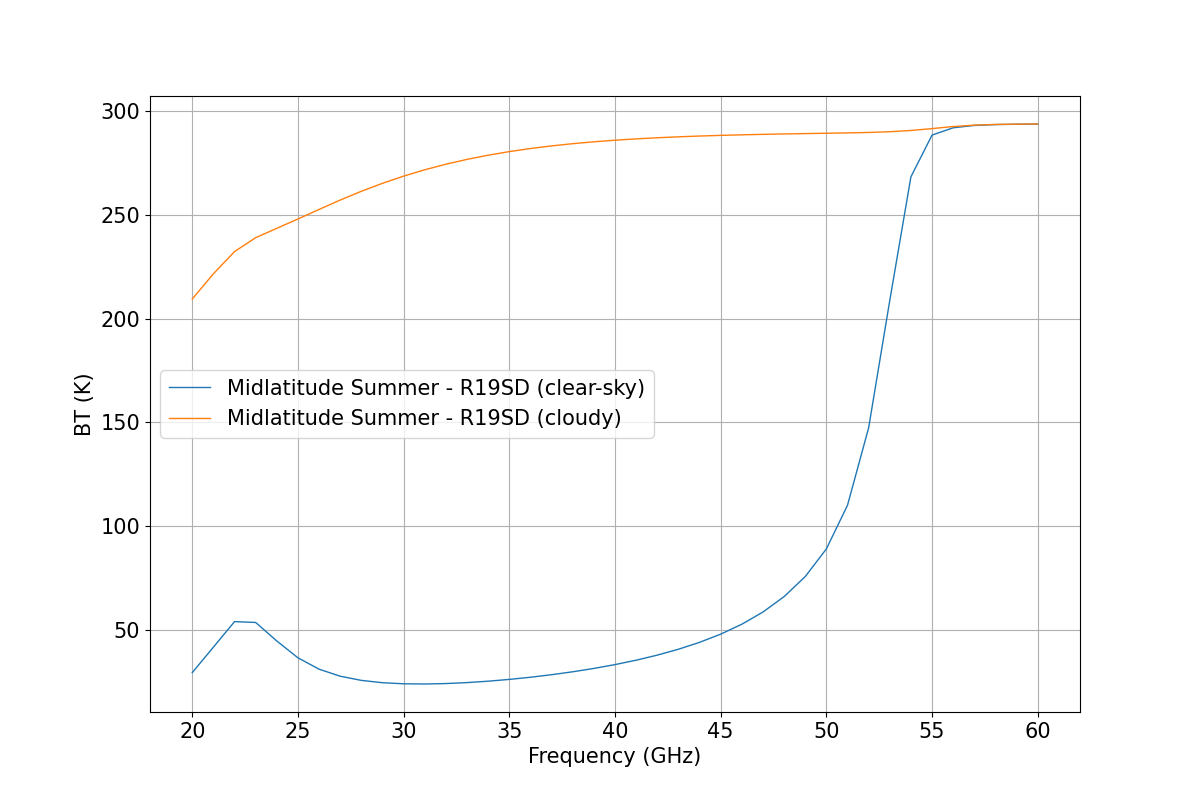Note
Go to the end to download the full example code.
Performing Downwelling Brightness Temperature calculation in cloudy condition.#
This example shows how to use the
pyrtlib.tb_spectrum.TbCloudRTE method to calculate brightness temperature from ground (downwelling) in cloudy condition
import matplotlib.pyplot as plt
from matplotlib.ticker import FixedLocator, FormatStrFormatter
plt.rcParams.update({'font.size': 15})
import numpy as np
np.seterr('raise')
from pyrtlib.climatology import AtmosphericProfiles as atmp
from pyrtlib.tb_spectrum import TbCloudRTE
from pyrtlib.utils import ppmv2gkg, mr2rh
atm = ['Tropical',
'Midlatitude Summer',
'Midlatitude Winter',
'Subarctic Summer',
'Subarctic Winter',
'U.S. Standard']
fig, ax = plt.subplots(1, 1, figsize=(12, 8))
z, p, d, t, md = atmp.gl_atm(atmp.MIDLATITUDE_SUMMER)
gkg = ppmv2gkg(md[:, atmp.H2O], atmp.H2O)
rh = mr2rh(p, t, gkg)[0] / 100
mdl = 'R19SD'
ang = np.array([90.])
frq = np.arange(20, 61, 1)
nf = len(frq)
denliq = np.zeros(z.shape)
denice = np.zeros(z.shape)
cldh = np.empty((2, 2))
for i in [False, True]:
if not i:
text_plot = 'clear-sky'
else:
# build a cloud
ib = 1
it = 3
denliq[ib:it + 1] = 10 * np.ones((it - ib + 1))
cldh[:, 0] = np.array([z[ib], z[it]])
ib = 29
it = 31
denice[ib:it + 1] = 0.1 * np.ones((it - ib + 1))
cldh[:, 1] = np.array([z[ib], z[it]])
text_plot = 'cloudy'
ax.set_xlabel('Frequency (GHz)')
ax.set_ylabel('BT (K)')
rte = TbCloudRTE(z, p, t, rh, frq, ang)
rte.satellite = False
rte.cloudy = i
rte.init_cloudy(cldh, denice, denliq)
rte.init_absmdl(mdl)
df = rte.execute()
df = df.set_index(frq)
df.tbtotal.plot(x=frq, ax=ax, linewidth=1,
label='{} - {} ({})'.format(atm[atmp.MIDLATITUDE_SUMMER], mdl, text_plot))
ax.grid(True, 'both')
ax.legend()
plt.show()

/home/runner/work/pyrtlib/pyrtlib/pyrtlib/tb_spectrum.py:221: UserWarning: It seems that TbCloudRTE.cloudy attribute is not set to True. Sets it to True for running model in cloudy condition.
warnings.warn("It seems that TbCloudRTE.cloudy attribute is not set to True. "
Total running time of the script: (0 minutes 2.586 seconds)
